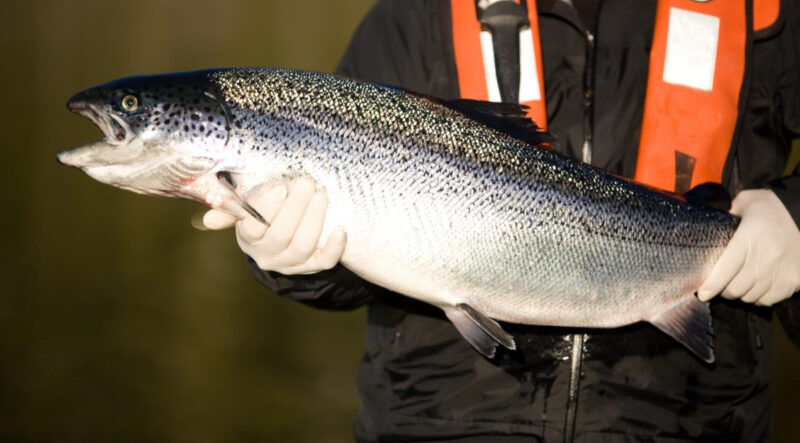‘Salmon Wars’ in the media undermines aquaculture sustainability
Extremist criticism of farmed salmon may have made sense a decade ago, but in 2022 we must question the quality of the research used by aquaculture detractors
Commentary
By Jack Cheney
Sustainable Fisheries
University of Washington
To promote their new book, Salmon Wars, writers Douglas Frantz and Catherine Collins published an article attacking salmon aquaculture in Time Magazine. The article, recommended that readers completely avoid all open net pen-reared Atlantic salmon.
“Farmed Atlantic salmon from open-net pens is off our menu and should be off yours,” they concluded.
The seafood industry and sustainable aquaculture advocates were quick to rebut, with the National Fisheries Institute and the National Aquaculture Association posting thorough fact checks.
Saving Seafood and industry expert Jennifer Bushman also added her frustrations.
Frantz and Collins are being compared to Seaspiracy for their sensational claims and unrepresentative, narrow characterizations of a broad and diverse farmed salmon industry. Salmon can be produced with detrimental impacts on the surrounding habitat, but it can also be produced sustainably. In fact, the majority of Atlantic farmed salmon produced globally in 2021 was considered environmentally sustainable.
More than 50% came from Aquaculture Stewardship Council (ASC) certified farms alone, with another significant chunk earning Best Aquaculture Practice (BAP) certification, and more still coming from farms in New Brunswick, Canada, northern Norway, or southeast Chile, where the Monterrey Bay Aquarium Seafood Watch program rates them “Good Alternative.”
In their Time magazine piece, the authors claim Seafood Watch “recommends avoiding most farmed Atlantic salmon,” but that is completely false.
As we explain in our sushi guide, many single-source ratings for Atlantic salmon on Seafood Watch are rated as Avoid, but looking at tonnage produced, the majority are ASC certified, meeting Seafood Watch’s benchmark for at least a Good Alternative.
According to Frantz and Collins, the only possible sustainable future for the farmed Atlantic salmon industry is “recirculating aquaculture systems” or RAS.
There are obvious benefits for indoor-recirculating salmon farms in terms of avoiding wild salmon habitat and lowering risk of disease transmission. But many RAS salmon farms do not disinfect wastewater and, according to a 2016 study, produce double the greenhouse gas emissions of open net pen farms.
In recent studies, open net pen-reared Atlantic salmon compared favorably to other meat industries (lower carbon footprint than beef and pork) and even outperformed the Impossible Burger 2.0 in a GHG emissions comparison.
RAS are also expensive to build and operate compared to open net pens. While RAS will become more prevalent for salmon and other farmed seafood species in the coming years, they may only be available to wealthy consumers.
Extremist criticism of farmed salmon may have made sense a decade ago, but in 2022 we must question the quality of the research used by Frantz and Collins.
Farmed salmon is a relatively new industry and is considered the fastest-growing food production system in the world. This growth over the last 30 years definitely included some environmentally unsustainable operations, but tremendous improvements have been made.
Consumers should continue to be critical of their food sources and hold producers and retailers accountable to raise the bar and communicate transparently; but by all accounts, this is exactly what the industry is doing.
The volume of ASC-certified salmon on the global market has risen by 50% since January 2021. Frantz and Collins are correct to cite studies about consumer preference for sustainable products – the farmed salmon industry reads those stories too and is responding. Even heavily-criticized salmon producers like Mowi top the list of most sustainable protein-producing companies in the world.
The farmed salmon industry has nuance and deserves better reporting. It’s disappointing to see a well-known author duo like Frantz and Collins choose fear-mongering over constructive discourse. With their platform, they could have fairly criticized the lagging actors and lauded those making sustainable strides.
They could have informed readers to make better choices at the grocery store. Instead, they are creating headaches for sustainable producers and misinforming the public, potentially pushing consumers to less sustainable dinner alternatives.
Jack Cheney has sourced, sold, cooked, and sustainably certified seafood over the past 10 years. In addition to his contributions to Sustainable Fisheries UW, he is working to increase traceability into supply chains and educate consumers, chefs and retailers on the value of environmentally sustainable seafood. He earned a Master’s in Marine Affairs from the University of Washington in 2015.
(Image courtesy of Mowi)

